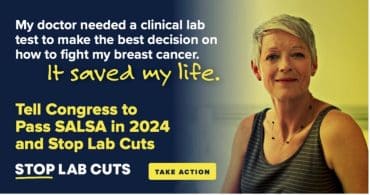Washington, D.C. – In response to the U.S. Food & Drug Administration (FDA) releasing its Final Rule to regulate laboratory developed testing services as medical devices under the Federal Food, Drug, and Cosmetic Act, the following statement can be attributed to American Clinical Laboratory Association (ACLA) President Susan Van Meter:
“The FDA today released a final rule to regulate laboratory developed testing services as medical devices. While ACLA is currently reviewing the rule, our position has been clear and consistent: Laboratory developed testing services are not medical devices and subjecting them to medical device regulation will harm patient access to needed testing and compromise innovations that drive personalized medicine.
ACLA has grave concerns about this rule as a matter of both policy and law. The rule will limit access to scores of critical tests, increase health care costs, and undermine innovation in new diagnostics. The rule also exceeds FDA’s statutory authority, as Congress has never granted the agency authority to regulate laboratory developed testing services offered by laboratory professionals.
We are disappointed that FDA has continued down this path. That is not just ACLA’s view. At a recent congressional hearing, it was clear that there is little support for the agency’s approach among members of Congress and key stakeholders. Clinical laboratories are already subject to robust regulation and oversight, and ACLA maintains that new legislation would be required for the FDA to regulate laboratory developed testing services.
ACLA has committed to working with Congress, FDA, and other stakeholders on legislation that would create a regulatory framework tailored to the dynamic nature of laboratory diagnostics. We urge FDA to resume work on legislation rather than unilaterally imposing medical device authorities that Congress never intended for this purpose. The future of patient care depends on it.”
ACLA previously submitted comments addressing the many problems with FDA’s proposal. Learn more here.
###
The American Clinical Laboratory Association (ACLA) is the national trade association representing leading laboratories that deliver essential diagnostic health information to patients and providers by advocating for policies that expand access to the highest quality clinical laboratory services, improve patient outcomes, and advance the next generation of personalized care.
